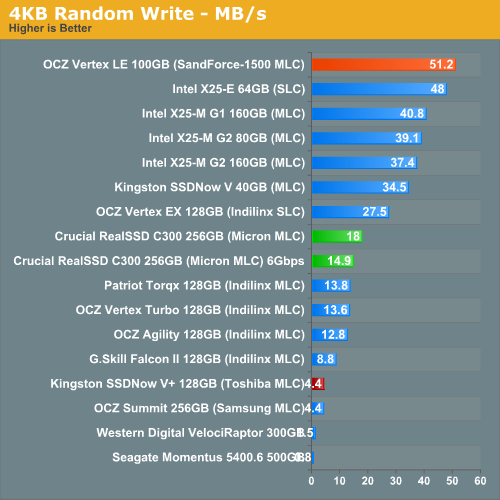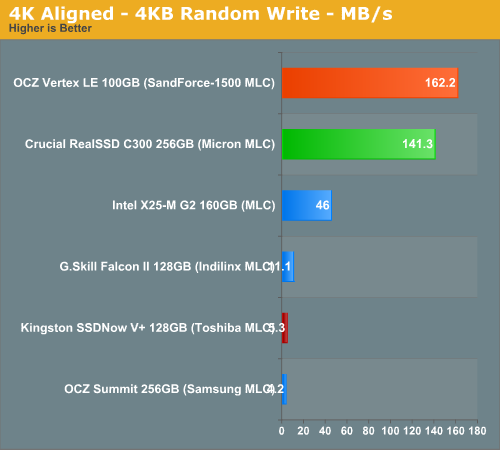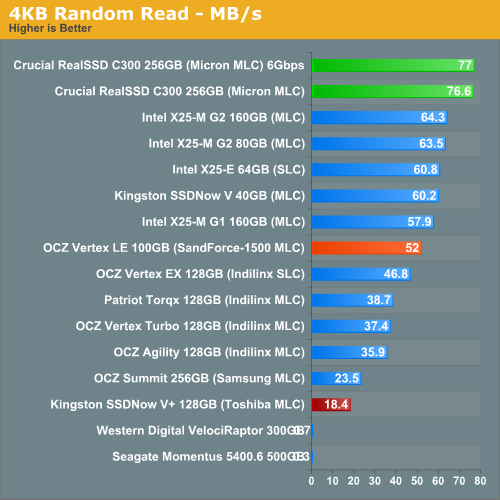OCZ’s Vertex Limited Edition Review & SSD State of the Union
by Anand Lal Shimpi on February 19, 2010 12:00 AM EST- Posted in
- Storage
Random Read/Write Speed
This test writes 4KB in a completely random pattern over an 8GB space of the drive to simulate the sort of random writes that you'd see on an OS drive (even this is more stressful than a normal desktop user would see). I perform three concurrent IOs and run the test for 3 minutes. The results reported are in average MB/s over the entire time.
I've had to run this test two different ways thanks to the way the newer controllers handle write alignment. Without a manually aligned partition, Windows XP executes writes on sector aligned boundaries while most modern OSes write with 4K alignment. Some controllers take this into account when mapping LBAs to page addresses, which generates additional overhead but makes for relatively similar performance regardless of OS/partition alignment. Other controllers skip the management overhead and just perform worse under Windows XP without partition alignment as file system writes are not automatically aligned with the SSD's internal pages.
First up is my traditional 4KB random write test, each write here is aligned to 512-byte sectors, similar to how Windows XP might write data to a drive:

The OCZ Vertex LE does ridiculously well here, outperforming even Intel's X25-E. The Crucial RealSSD C300 does ok, a bit better than the Indilinx drives but no where near as good as the Intel based offerings. The reason being that the C300's controller doesn't actually attempt to reorganize unaligned writes on the fly. Look at what happens to 4K random write performance if we only write to 4K-aligned addresses:

Not only does the Vertex LE jump in performance to over 160MB/s, but so does the RealSSD C300. The Intel and Indilinx drives also get a small boost, but nothing huge by comparison. Modern 4K-aware OSes write data in 4K aligned addresses, which matches up perfectly with the 4K page size on all of these SSDs. You can also guarantee higher performance in older OSes like Windows XP by re-mapping the LBAs on the fly but that requires additional overhead. These newer drives forgo performance under Windows XP, for significantly better performance under Windows Vista/7 and Mac OS X 10.5/6. It makes sense given that Intel's X25-M was designed back in 2005 - 2007 while these newer controllers were more recent endeavors.

Random read performance is great on the C300 but a bit lower on the Vertex LE. None of these drives are posting bad figures here though. For the price the Kingston SSDNow V+ doesn't appear to deliver its worth.










83 Comments
View All Comments
allessd - Saturday, February 20, 2010 - link
maybe this site is of interest to you:"SSD Decoder Ring - an SSD comparison guide"
www.pcper.com/article.php?aid=736
Jupie - Saturday, February 20, 2010 - link
Great article - always nice to hear about SSDs as I clearly see them as the future for a boot drive at least.What I'm curious about is the performance of drives of the same series with different capacities. I'm not willing to spend ~800 USD on a drive but rather ~400 USD. How much performance hit does a Real SSD C300 really take? Manufactors clearly seem to prefer to send their biggest drives with the highest performance to test but what about the performance of the reasonalbe priced ~100 GB versions?
Would be great to read about that as well ;o)
Otherwise keep up the good articles!
MadMan007 - Saturday, February 20, 2010 - link
Yeah this is an important point, it applies to regular HDs to a much lesser extent too. I would like to see tests on smaller capacity drives of a given series. I guess a lot depends on implentation, for example using the same number of flash chips with a given controller just of a lower capacity per chip versus using fewer flash chips and channels.Conscript - Friday, February 19, 2010 - link
Not sure why I'd pay the premium for "limited" SF-1500 drives when I can just get the same thing here, for less...http://eshop.macsales.com/shop/internal_storage/Me...">http://eshop.macsales.com/shop/internal_storage/Me...
Anand, any chance you think they'd give you one for review? Thinking about putting one of these in my new MBP (when they come out). Unless the new MBP has SATA 3, in which case I might look hard at the C300.
iwodo - Friday, February 19, 2010 - link
May be Anand can do an article on that. You mention previously that controller contribute VERY little to the total cost of SSD. NAND being the major part.If that is the case, then assuming we always need 8 chips for an SSD. SSD Prices wont ever dropped below $100? Because while capacity per unit will grow, it seems minimum unit prices dont fall that much.
icrf - Saturday, February 20, 2010 - link
Yeah, I'd love to see a reliable, slow 8-16 GB drive for $50. I've got a RAID server that can't seem to keep up boot drives and would love something like that.Bolas - Friday, February 19, 2010 - link
So if I'm willing to spend up to $1200 for a boot drive, what's the best option? Crucial? Vertex LE? Intel? OCZ Z-Drive? Something else?czesiu - Friday, February 19, 2010 - link
Any chances for a Kingston SNV425 review?mckirkus - Friday, February 19, 2010 - link
I would like to see what pure RAM drive based storage would do so we can get a sense of how close these drives are getting to some sort of maximum.I'm not sure if you can do this with a RAMDisk you create with software or if and entire image would need to run in RAM (HDTach, etc., will not work on RAM drives for some reason. Just to be clear, I'm not referring to benchmarks of RAM using a SATA interface.
Good stuff yet again Anand.
mindless1 - Friday, February 19, 2010 - link
There is no "sort of maximum", DRAM keeps getting faster.However, if you were to create and use a RAMDISK, however you ended up doing so, it would destroy any flash drive in terms of performance on every possible parameter. The question is not about performance at all, rather the implementation and volatile nature of using it... and of course that it's no small feat to end up with hundreds of GB worth of those chips for typical HDD replacement purposes (in a reasonably sized form factor).